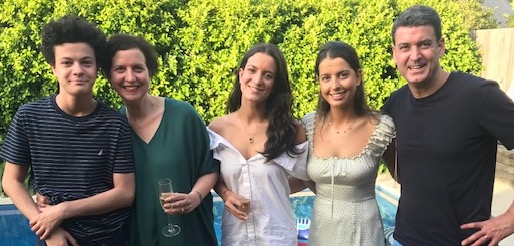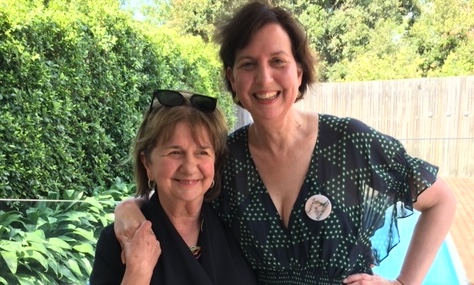By Sarah Tidey
Sarah Tidey is a freelance writer and former lawyer who was diagnosed with ovarian cancer in October 2015. She is currently having her fourth line of chemotherapy. She lives in Melbourne with her husband and three children aged 20, 18 and 16.

It’s a conversation none of us want to have with our kids.
After surgery, when my diagnosis was confirmed, my husband drew the short straw of telling them. A counsellor gave us a lovely leaflet on how to talk to your children about cancer but it was pitched at people with really young children. Somehow the stick figure characters on the front weren’t right for my ‘too cool for school’ teenagers.
I had imagined a ‘family meeting’ with some lollies (including some raspberry bullets for me). There would have been an explanation of what ovarian cancer and the treatment was. My husband’s version involved none of that.
My husband is gentle, logical, and great at getting to the point. There was no discussion of stages of cancer, or long-term prognosis. He told them:
“Mum has ovarian cancer, and she is going to get a whole lot sicker before she gets better.”
What he did was perfect. He gave them an explanation in a snapshot. It was information that would be a shock and hard to digest, so he gave them only as much as they needed to know. Further understanding would come gradually. We encouraged them to ask questions. I’m sure there was some undercover googling, which breaks my heart.
Understanding ovarian cancer together
Our lived experience has been an important part of teaching them about this disease. Once I returned from hospital it was clear to the kids how sick I was. I was walking bent over, sleeping for long periods and unable to drive. Later as we morphed into the chemo cycle, I got sick and got better and then got sick and got better - and they adjusted to the rhythm of that.
When they were younger, I was reluctant to burden them with too much detail about cancer. I didn’t want a cloud hanging over them. As they have matured, I’ve shared more information with them about the seriousness of the disease. I’ve opened up about my own feelings about it through the advocacy work I’ve done with the Ovarian Cancer Research Foundation, new developments in ovarian cancer research, and fundraisers for that research.
Four years and three more cycles of chemo later, the rhythm continues. I still hate telling them about each recurrence or new cycle of chemotherapy, but it’s also become easier. Cancer has become the undercurrent to our lives. They understand that I might need to stay in bed longer today or that they might need to cook, but that on days when I feel well I can take them for a driving lesson or help them with their homework.
They know that I am always keen to hear about their day or what they are concerned about. As time has passed the repetition has slowly cemented how serious this is. It’s not going away. The importance of spending time together is an unspoken understanding.

I am grateful for my own mum’s love
I don’t have any known genetic component to my cancer. It's possible it's simply an aberration, some cells gone rogue. I hope for my mum, my aunties, and my daughters’ sake that is the case. I remind them they will need to be vigilant and get themselves checked. I want them to be aware but at the same time I don’t want them to live in fear. I have set out in writing all the details I know (and don’t know) about my cancer in case they need it in future.
While other cancers can be diagnosed by effective screening at an early stage (e.g. cervical cancer by PAP smear or breast cancer by mammography), an early detection test for ovarian cancer does not exist. The OCRF’s priority is developing an early detection test. I hope my daughters will be beneficiaries of that.
In many ways my diagnosis has been just as hard on my own mother, it must be a terrible blow as a parent. Mum told me it’s the disease she always feared getting herself. It has made her more vigilant about her own health. We were close beforehand, but this has definitely made us even more so. I am incredibly grateful she is fit and well and able to be so supportive. Besides me, she is probably the person in my family who best understands the disease. Over the years, she has listened to my fears and hopes ad infinitum.
This Mother’s Day, I am grateful for her love and for each extra day I get to be a mother myself.
ABOUT OCRF
As Australia’s #1 charity dedicated to funding ovarian cancer research, our top priority is improving outcomes for women like Sarah and her family.
Our research has already contributed to significant knowledge around the basic biology of ovarian cancer. This includes better understandings of disease subtypes, cancer origin, and cancer growth and spread.
Women like Sarah have been an inspiration to our researchers. They are now making significant progress in treatment innovations that will improve the outlook for women living with ovarian cancer. We are proud to have played a role in that future through our advocacy work, which succeeded in generating significant government investment in the early detection and prevention of ovarian cancer through the National Women’s Health Strategy 2020–2030.
Our vision is to ensure a future where no women's lives are threatened from ovarian cancer. With your support, we can continue to make this goal a reality for all women and their families impacted by an ovarian cancer diagnosis.